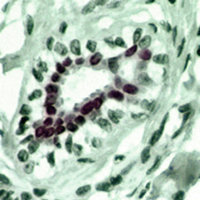Breast Cancer

Risk for breast cancer is influenced by environmental and lifestyle factors as well as genetics. NIEHS-funded research is using a variety of approaches to increase knowledge about how the environment interfaces with other factors to shape risk for this complex disease.
Scientists are finding that the breast is more vulnerable to environmental exposures during certain periods of time, also called windows of susceptibility. Identifying windows of susceptibility and understanding the processes that occur during these periods of time could help protect future generations from breast cancer.
What NIEHS is doing
Breast Cancer and the Environment Research Program
NIEHS and the National Cancer Institute co-fund the Breast Cancer and the Environment Research Program (BCERP), which supports multidisciplinary scientists, clinicians, and community partners studying environmental exposures during windows of susceptibility. The program continues and expands the work of the Breast Cancer and the Environment Research Centers (BCERC) Network, which ended in 2010.
The BCERP windows of susceptibility studies address environmental influences on breast cancer risk throughout life using laboratory methods and by studying large groups of people. The program’s puberty study is following more than 1,200 young girls to better understand predictors of early puberty, which is associated with increased breast cancer risk.
Contacts
-

-
Leslie J. Reinlib, Ph.D. (http://www.niehs.nih.gov/research/supported/dert/sphb/staff/reinlib/index.cfm)
Health Scientist Administrator
Program Director -
PO BOX 12233
RTP, NC 27713
Tel (919) 541-4998
Fax (919) 316-4606
reinlib@niehs.nih.gov
-

-
Caroline Dilworth, Ph.D. (http://www.niehs.nih.gov/research/supported/dert/sphb/staff/dilworth/index.cfm)
Health Scientist Administrator -
National Institute of Environmental Health Sciences
P.O. Box 12233
Research Triangle Park, NC 27709
Tel (919) 541-7727
Fax (919) 316-4606
dilworthch@niehs.nih.gov
Epigenetic Research
In addition, the NIEHS-funded research program to look at environmental epigenetics is studying topics such as the relationship of epigenetic changes to breast cancer as well as how exposure to dioxins and other endocrine disruptors affect breast cancer risk.
Contacts
-

-
Lisa Helbling Chadwick, Ph.D. (http://www.niehs.nih.gov/research/supported/dert/cospb/staff/chadwick/index.cfm)
Program Administrator -
P.O. Box 12233
Research Triangle Park, NC 27709
Tel (850) 727-7218
Fax (301) 451-5392
chadwickl@niehs.nih.gov
-

-
Frederick (Fred) Tyson, Ph.D. (http://www.niehs.nih.gov/research/supported/dert/cospb/staff/tyson/index.cfm)
Program Administrator -
Tel (919) 541-0176
Fax (919) 316-4606
tyson2@niehs.nih.gov
Interagency Breast Cancer and Environmental Research Coordinating Committee
To facilitate communication and recommend future directions for breast cancer research, NIEHS and NCI formed the Interagency Breast Cancer and Environmental Research Coordinating Committee. This congressionally mandated committee is composed of representatives from federal agencies, non-federal scientists and health care professionals, and advocates for individuals with breast cancer.
Contacts
-

-
Jennifer Collins (http://www.niehs.nih.gov/research/supported/dert/sphb/staff/collins/index.cfm)
Program Analyst -
PO Box 12233
RTP, NC 27709
Tel (919) 541-0117
Fax (919) 541-2860
collins6@niehs.nih.gov

